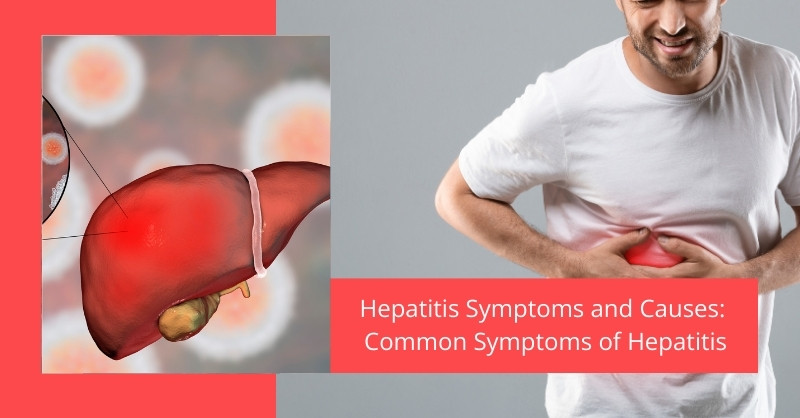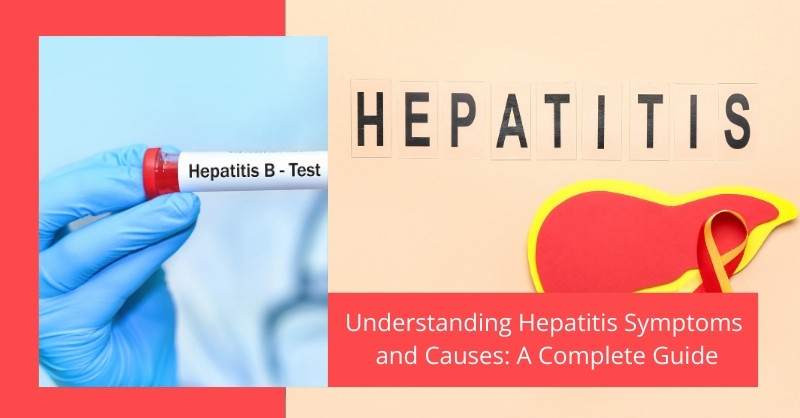Hepatitis Symptoms and Causes: What Is Hepatitis?
Hepatitis refers to inflammation of the liver, which can occur for a variety of reasons. The most common cause is a viral infection. However, factors such as excessive alcohol use, exposure to toxins, autoimmune disorders, and certain medications can also contribute to the condition. Hepatitis can be acute (short-term) or chronic (long-term), depending on its duration.
For this reason, understanding the different types of hepatitis is vital. Each type has unique symptoms and risk factors. Unfortunately, many cases remain undetected for years, especially chronic forms. If left untreated, hepatitis can result in complications, such as cirrhosis, liver failure, or even liver cancer, which could be life-threatening.
Hepatitis Symptoms and Causes: Types of Hepatitis
Hepatitis can be categorized into five main types caused by viruses: A, B, C, D, and E. In addition, non-viral forms of hepatitis, such as alcoholic or autoimmune hepatitis, also exist. Below is an overview of the main types:
-
Hepatitis A (HAV)
Cause: Consuming contaminated food or water.
Nature: Acute and usually resolves without becoming chronic.
Prevention: Maintaining hygiene and receiving vaccination.
-
Hepatitis B (HBV)
Cause: Spread through contact with blood, semen, or other bodily fluids.
Nature: Acute for some individuals but may become chronic, particularly if contracted at birth.
Prevention: Safe sex practices, avoiding shared needles, and vaccination.
-
Hepatitis C (HCV)
Cause: Primarily transmitted via blood-to-blood contact, often due to shared needles or unsafe medical practices.
Nature: Chronic in the majority of cases if left untreated, leading to severe liver damage over time.
Prevention: Avoid sharing personal items like razors and ensure safe medical procedures.
-
Hepatitis D (HDV)
Cause: Develops only in individuals already infected with hepatitis B.
Nature: Co-infection that can exacerbate hepatitis B symptoms.
Prevention: Preventing hepatitis B also protects against hepatitis D.
-
Hepatitis E (HEV)
Cause: Spread by consuming contaminated water, similar to hepatitis A.
Nature: Acute and self-limiting in most cases, though severe in pregnant women.
Prevention: Access to safe drinking water and proper hygiene practices.
Hepatitis Symptoms and Causes: Common Symptoms of Hepatitis

The symptoms of hepatitis can vary depending on the cause and severity of the condition. For instance, acute hepatitis may have noticeable symptoms, while chronic cases may remain asymptomatic for years. Below are common symptoms seen in most forms of hepatitis:
- Fatigue and persistent weakness
- Yellowing of the skin and eyes (jaundice)
- Dark-colored urine and pale stools
- Nausea, vomiting, and reduced appetite
- Pain or discomfort in the upper right abdomen
- Fever, chills, and joint pain
Occasionally, symptoms might not appear until substantial liver damage has already occurred. Hence, regular check-ups are crucial to ensure early diagnosis and timely treatment.
What Causes Hepatitis?
The causes of hepatitis are diverse and depend on the specific type of condition. However, certain contributing factors are more common:
- Viral Infections: The majority of hepatitis cases worldwide result from viral infections. Hepatitis A, B, C, D, and E viruses are particularly harmful to liver cells, causing inflammation and, in some cases, permanent damage.
- Alcohol and Toxins: Excessive alcohol intake is one of the leading non-viral causes of hepatitis. In addition, exposure to harmful chemicals or toxins can cause significant damage to liver cells, resulting in inflammation.
- Autoimmune Disorders: Autoimmune hepatitis occurs when the immune system mistakenly attacks healthy liver cells. If left untreated, this can result in chronic liver inflammation and scarring.
- Medications: Certain drugs, especially when taken in high doses, can lead to liver toxicity. Over-the-counter medications such as acetaminophen are a frequent cause of drug-induced hepatitis.
- Poor Lifestyle Choices: Risk factors such as unprotected sex, needle sharing, or consuming contaminated food and water can dramatically increase the likelihood of contracting hepatitis. Additionally, individuals with compromised immune systems or genetic predispositions are more vulnerable.
Hepatitis Symptoms and Causes: Prevention Tips for Hepatitis
Fortunately, preventing hepatitis is often possible with proactive measures. Consider the following prevention strategies:
- Vaccination: Vaccines are widely available for hepatitis A and B. Receiving these vaccines also prevents hepatitis D infection.
- Good Hygiene: Regularly washing hands, especially before meals, reduces the risk of contamination.
- Clean Water Supply: Ensuring access to safe water prevents hepatitis A and E.
- Avoid Risky Behaviors: Practices like using condoms during sex or avoiding shared needles greatly reduce the risk.
- Moderate Alcohol Use: Reducing alcohol consumption significantly lowers the risk of alcoholic hepatitis.
Moreover, public awareness campaigns about hepatitis can help reduce the number of new infections.
Hepatitis Symptoms and Causes: Diagnosis and Treatment Options

If you experience symptoms of hepatitis, consulting a healthcare provider is essential. Diagnosis generally involves blood tests, imaging studies, or, in some cases, a liver biopsy. Once diagnosed, the treatment depends on the type and severity of hepatitis:
- Antiviral Medications: Frequently used for treating hepatitis B and C infections.
- Immunosuppressants: Useful for autoimmune hepatitis.
- Lifestyle Modifications: Avoiding alcohol and maintaining a healthy diet can improve liver function.
- Liver Transplant: Necessary for individuals with advanced liver failure.
The good news is that early intervention can dramatically improve outcomes. For example, timely antiviral therapy for chronic hepatitis B or C can prevent severe complications such as cirrhosis or cancer.
Long-Term Complications of Hepatitis
Without timely treatment, hepatitis can lead to severe consequences:
- Liver Cirrhosis: Permanent scarring of the liver tissue reduces its function.
- Liver Failure: Loss of the liver’s ability to perform essential tasks.
- Liver Cancer: Chronic viral hepatitis is a major risk factor for developing liver cancer.
Not only do these conditions impact physical health, but they also take an emotional toll. Consequently, support from family and medical professionals is critical.
Lifestyle Tips for Hepatitis Management
Managing hepatitis often requires changes in daily habits. Fortunately, many of these adjustments improve overall health.
- Eat a Nutrient-Rich Diet: Focus on whole foods like fruits, vegetables, and lean proteins. Avoid processed and fatty foods.
- Exercise Moderately: Light physical activity helps enhance liver function.
- Avoid Liver Strain: Eliminate alcohol consumption and avoid smoking.
- Stay Hydrated: Drink enough water every day to promote healthy organ function.
Additionally, joining a support group can provide emotional resilience during recovery or long-term management.

Conclusion: Take Action to Protect Your Liver
Hepatitis symptoms and causes are essential knowledge for anyone striving to maintain good health. By recognizing the early signs and taking preventive measures, you can effectively protect yourself from complications. Furthermore, staying informed, adopting a healthy lifestyle, and getting vaccinated when recommended are key steps toward safeguarding your liver. Remember, early action often determines better outcomes, so don’t hesitate to prioritize your health today.



